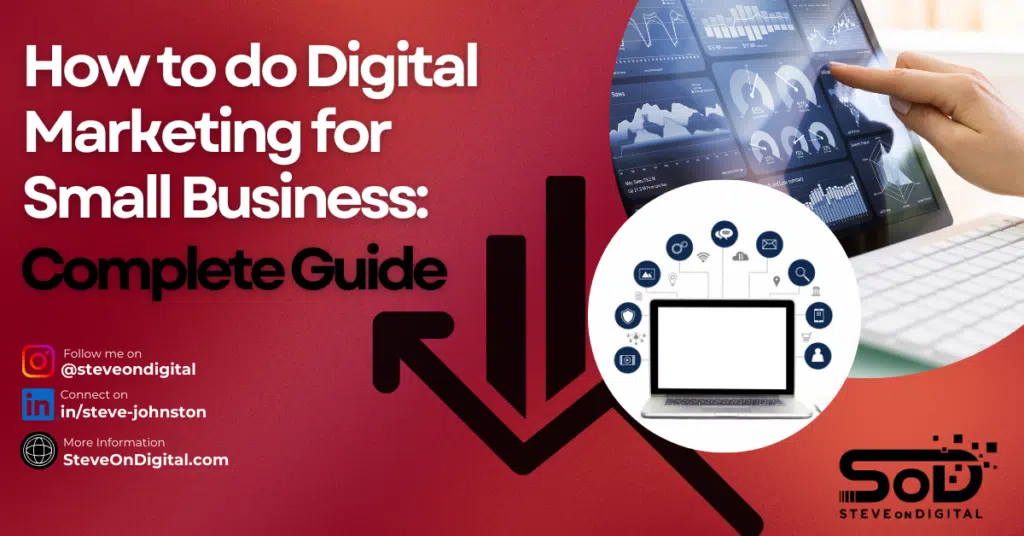How To Do Digital Marketing For Small Business: Complete Guide

To do digital marketing for a small business, start by identifying your target audience. Focus on understanding their needs and preferences through market research. Use this data to tailor your digital marketing strategy, ensuring you reach the right people effectively. Digital marketing is essential for small businesses today. It helps build a strong online presence, connects with customers, and drives sales. By leveraging content marketing, social media platforms, and data-driven insights, you can compete with larger companies without needing a massive budget. I’m Steve, a digital transformation expert with a strong background in electrical engineering, an MBA, and a master’s in Project Management. I excel at helping SMEs navigate the digital landscape with practical insights. Let’s begin! Understanding Your Target Audience Knowing who you’re talking to is the cornerstone of any successful digital marketing strategy. When I first started, I made the mistake of trying to appeal to everyone. It didn’t take long to realize that understanding my specific target audience was the key to making my marketing efforts effective. Conducting Market Research Market research is the first step in identifying your target audience. It involves digging deep into the demographics, behaviors, and preferences of your potential customers. I use tools like Google Analytics and Facebook Insights to gather data on who’s visiting my website and engaging with my content. For small businesses, this step is critical because it helps you focus your resources on the people most likely to convert into paying customers. Creating Customer Personas Once I gathered enough data, I created detailed customer personas—profiles representing different segments of my audience. These personas include details like age, gender, income level, interests, and buying habits. By visualizing who my ideal customers are, I can tailor my marketing messages to resonate with them more effectively. For instance, when targeting young entrepreneurs, I emphasize innovative digital marketing techniques and tools that save time and money. Analyzing Customer Behavior Understanding how your customers behave online is just as important as knowing who they are. I frequently analyze data to see which pages they visit most, what content they engage with, and how they navigate through my website. This helps me tweak my digital marketing efforts to better align with their needs and preferences. Tools like heat maps and user session recordings are invaluable for gaining insights into customer interactions. Building a Strong Online Presence A strong online presence is the foundation of successful digital marketing. When potential customers search for products or services online, you want your business to be front and center. For small businesses, building this presence is all about creating a professional website, optimizing for search engines, and maintaining consistent branding across all digital channels. Developing a Professional Website Your website is often the first point of contact with potential customers, so it needs to make a good impression. I invested in a user-friendly, mobile-responsive, and SEO-optimized website that not only looks professional but also performs well on search engines. Did you know that 53% of mobile users abandon sites that take longer than three seconds to load? That’s why having a fast, responsive site is crucial. Optimizing for Local SEO For small businesses, local SEO is a game-changer. By optimizing my site for local searches, I’ve seen a significant increase in foot traffic to my physical store. Claiming and optimizing my Google Business Profile was one of the best decisions I made. It boosted my visibility in local search results and helped me connect with customers in my community. Creating Consistent Branding Consistency is key when it comes to branding. I made sure that my brand’s voice, colors, and messaging are consistent across all digital channels. This not only makes my business more recognizable but also builds trust with my audience. Whether it’s my website, social media profiles, or email campaigns, everything aligns with my brand identity. Social Media Marketing for Small Businesses Social media has become an indispensable tool for connecting with customers. When I first started using social media for my business, I was amazed at how quickly I could engage with my audience and drive traffic to my website. Social media platforms are not just for sharing updates; they’re powerful marketing channels that can help you grow your business. Choosing the Right Social Media Channels Not all social media platforms are created equal, and choosing the right ones can make a big difference in your digital marketing success. I focus on platforms where my target audience spends most of their time. For example, I found that Instagram and Facebook are particularly effective for reaching small business owners and entrepreneurs. By focusing my efforts on these platforms, I’ve been able to build a strong, engaged community around my brand. Creating Engaging Social Media Content Content is king, especially on social media. I’ve learned that the key to successful social media marketing is creating content that resonates with my audience. Whether it’s a blog post, a video, or a simple update, I make sure it’s relevant, informative, and engaging. For instance, posting user-generated content, like photos and testimonials from satisfied customers, has significantly boosted my engagement rates. Utilizing User-Generated Content One of the most effective strategies I’ve used is leveraging user-generated content. Encouraging satisfied customers to share their experiences with my products has helped build trust and credibility. This type of content not only provides social proof but also helps me connect with my audience on a more personal level. According to a recent study, 79% of people say user-generated content highly impacts their purchasing decisions. Content Marketing Strategy Content marketing is one of the most effective ways to drive traffic, engage your audience, and improve search engine rankings. From my experience, it’s not just about pushing out content—it’s about creating something that resonates with your audience and keeps them coming back for more. When done right, content marketing can be a game-changer for small businesses looking to establish a strong online presence. Creating Relevant Content When I first started, I struggled to figure out what

